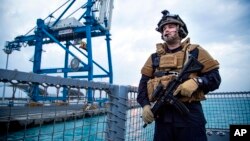Norwegian and Danish naval teams, on their way to remove chemical weapons from Syria, have turned back and are heading for Cyprus as an end-of-year deadline to remove most of the toxins from the war-torn country passed unmet.
A spokesman for the Norwegian armed forces told VOA that two container vessels, along with warship escorts, had been deployed to carry the toxic cargo for the destruction process under international supervision.
He said the ships were preparing for a refueling stop in the Cypriot port of Limassol ahead of a likely return to Syria "after the New Year."
An official from the Organization for the Prohibition of Chemical Weapons said security concerns and bureaucracy are the primary reasons President Bashar al-Assad's government missed Tuesday's deadline.
Bad weather and a complex multinational procurement effort for equipment have also delayed the operation.
For now, the delay is not raising concern in Washington, which characterized the deadline as ambitious. The State Department said it was satisfied to see "forward progress."
The New York Times, citing sources with the mission to remove the weapons, reported earlier that Syria apparently has not begun to move weapons toward the port staging areas.
The Syrian government agreed to allow the U.N. and the OPCW access to its chemical weapons arsenal for destruction at sea.
On November 15, the OPCW outlined a plan to have many of the most deadly weapons moved out by December 31 and ensure that Syria destroys its entire chemical arsenal by the middle of 2014.
Mission officials and analysts told VOA that the initial phase of the plan involves Syria packaging and transporting the weapons over land across Syria to Latakia, its major port on the Mediterranean Sea.
The Danish and Norwegian cargo ships will then transport the material from the port to a yet-to-be designated Italian destination.
There the weapons will be loaded onto the U.S. Navy vessel Cape Ray, which has been outfitted with equipment to neutralize the chemicals. The destruction is then scheduled to take place at sea.
Russia is providing armored trucks, water tanks and other logistical supplies for the land operation in Syria. Moscow also has said it will provide security for the operation at Latakia and in Syrian territorial waters.
China will be part of the initial military escort to Italy, and also will provide surveillance cameras and 10 ambulances to the operation.
A spokesman for the Norwegian armed forces told VOA that two container vessels, along with warship escorts, had been deployed to carry the toxic cargo for the destruction process under international supervision.
He said the ships were preparing for a refueling stop in the Cypriot port of Limassol ahead of a likely return to Syria "after the New Year."
An official from the Organization for the Prohibition of Chemical Weapons said security concerns and bureaucracy are the primary reasons President Bashar al-Assad's government missed Tuesday's deadline.
Bad weather and a complex multinational procurement effort for equipment have also delayed the operation.
For now, the delay is not raising concern in Washington, which characterized the deadline as ambitious. The State Department said it was satisfied to see "forward progress."
The New York Times, citing sources with the mission to remove the weapons, reported earlier that Syria apparently has not begun to move weapons toward the port staging areas.
The Syrian government agreed to allow the U.N. and the OPCW access to its chemical weapons arsenal for destruction at sea.
On November 15, the OPCW outlined a plan to have many of the most deadly weapons moved out by December 31 and ensure that Syria destroys its entire chemical arsenal by the middle of 2014.
Mission officials and analysts told VOA that the initial phase of the plan involves Syria packaging and transporting the weapons over land across Syria to Latakia, its major port on the Mediterranean Sea.
The Danish and Norwegian cargo ships will then transport the material from the port to a yet-to-be designated Italian destination.
There the weapons will be loaded onto the U.S. Navy vessel Cape Ray, which has been outfitted with equipment to neutralize the chemicals. The destruction is then scheduled to take place at sea.
Russia is providing armored trucks, water tanks and other logistical supplies for the land operation in Syria. Moscow also has said it will provide security for the operation at Latakia and in Syrian territorial waters.
China will be part of the initial military escort to Italy, and also will provide surveillance cameras and 10 ambulances to the operation.





